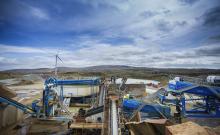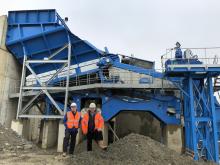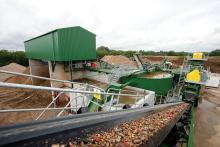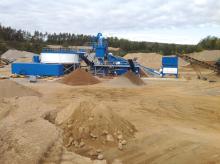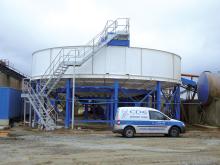An upgrade of the existing washing plant at the Draperstown Quarry operated by Creagh Concrete has released four million tonnes of material.
The work at Draperstown Quarry, Northern Ireland, which is operated by Creagh Concrete, has also extended the quarry life by ten years. Creagh Concrete is the largest land-based sand and gravel producer in Northern Ireland.
Its sand and aggregates, produced at various locations, are used in the production of a range of pre-cast products as well as ready-mix concrete.
“We currently produce 500,000tonnes of material per year with 75% used internally and the remaining 25% being sold to the local market” says Willie Doherty, divisional director at Creagh Concrete.
The upgrade to the existing
“The absence of a suitable attrition system within the existing plant needed to be addressed and it was at this point that we engaged with CDE Global to provide a tailored solution,” says Colm Scullion, quarry manager at Creagh Concrete.
The reserve is characterised by heavily claybound material with approximately 30% waste.
“The material we were faced with is among the worst that I’ve seen and at the outset all options were on the table including ceasing production at Draperstown and looking for reserves at a new site,” says Doherty.
Detailed discussions with the CDE Global project design team followed and a two-stage upgrade to the existing plant was agreed.
The first stage involved an upgrade of the existing water treatment and recycling system. It saw the replacement of the existing Aquacycle A400 thickener with the Aquacycle A1500, and this represents the first global installation for the new thickener, which was designed specifically for this application and highlights the partnership relationship that has existed between CDE Global and Creagh Concrete since the early 1990s.
“Before we could consider beginning to process this difficult material the water treatment system needed a substantial upgrade in order to be able to cope with the higher level of waste silts and clays that we would now be dealing with,” says Scullion.
“The Creagh Concrete and CDE Global relationship works because we both understand the need to keep innovating and coming up with new and improved processing systems to allow operators like us to extract maximum value from our reserves,” says Gerard McKeague joint managing director at Creagh Concrete. “This focus on efficient and sustainable management of our natural resources is central to our business.”
Unlike other instances where the Aquacycle thickener has been specified, the driver was not an issue with water supply but rather an example of how environmental considerations are at the centre of the decision making process for Creagh Concrete.
Stage two of the plant upgrade involved the introduction of the Aggmax portable logwasher (it incorporates a grizzly screen, Rotomax RX150S logwasher and Evoscreen dewatering screen on a single chassis) and an Evowash sand washing plant.
The new plant accepts minus 75mm as-dug material pre-screened at the face while the +75mm material is subsequently processed through an existing jaw crusher.
“One of the keys to success for the new plant was delivering the material to our plant freshly dug,” explains Paul O’Neill, CDE Global project manager on this installation.
“Our experience with heavily claybound material suggests that if it is stockpiled and exposed to rain it becomes almost impossible to handle.”
The minus 75mm material is delivered to a feed hopper and transferred to the Aggmax where the grizzly screen removes any remaining oversize material. After entering the Rotomax the feed material is subjected to extreme attrition which breaks down the clay. The 5-75mm material is dewatered while the 0-5mm material is sent to the Evowash sand washing plant. The 5-75mm material is then conveyed to the existing dry screening plant and classified into the various aggregate grades required by Creagh Concrete within its own pre-cast and ready mix concrete manufacturing operations.
The new plant operates at between 100-150tonnes/hour as a result of the variation in the feed material.
Before the new plant was installed Creagh Concrete was faced with a reserve that had cost £1/tonne of material processed based on the purchase price for the quarry in 1991. The introduction of the new plant has reduced this to £0.25/tonne.
“This makes the wash plant upgrade one of the best investments we have ever made,” says McKeague.

